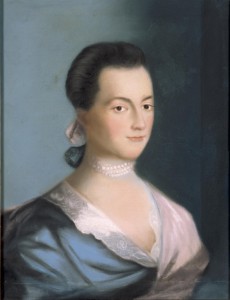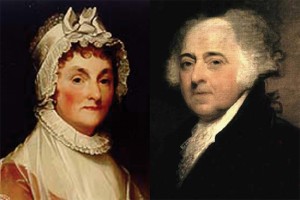By Carolyn Goode
I know the voice of Fame to be mere weathercock, unstable as Water and fleeting as a Shadow. Yet I have Pride, I know I have a large portion of it. –Abigail Adams
Abigail Adams was unlike most everyday colonial women, even before she married John Adams and became the First Lady of the United States. She was born on November 11, 1744, in Weymouth, Massachusetts. Her family was well-off, but because she was a female, she was not allowed to have any formal schooling. This did not stop her, though. Her family had a large library which enjoyed scouring, and she enjoyed being around her intelligent relatives, including her grandmother, who taught her valuable lessons. She was determined to find ways to become a learned young woman.
Abigail was a dutiful mother and wife, taking care of her children and, though it meant living apart from John Adams for about ten years, stayed with her children in Massachusetts while he moved to Philadelphia for the First Continental Congress. During this time, and in the time before this, Abigail grew fond of writing letters. She once wrote to John that “I hope in time to have the reputation of being as good a farmeress as my partner has of being a good Statesman.” (American National Biography.)
Abigail was usually very supportive of her husband and his politics. She grew fond of politics herself, and had strong opinions on issues such as slavery and women’s rights. In another letter to John she wrote “the passion for Liberty cannot be Eaquelly strong in the Breasts of those have been accustomed to deprive their fellow creatures of theirs.” (American National Biography.)
In the same letter, Abigail wrote her famous “Remember the Ladies” message, and she was serious about it. She was not shy about advocating for women, even to the most powerful men in the country. She wrote ” be more generous and favourable to them than your ancestors. Do not put such unlimited power into the hands of the Husbands. Remember all Men would be tyrants if they could. If perticuliar care and attention is not paid to the Laidies we are determined to foment a Rebelion, and will not hold ourselves bound by any Laws in which we have no voice, or Representation.” (American National Biography.) One might look at Abigail and George Washington as similar in the way they both were public about their thoughts, especially about slavery. Gordon Wood noted in his chapter about Washington that “in the political world, he knew how to make a dramatic move. One of his most impressive acts was his freeing of his slaves in his will.” (pg.37.) This is not to say that Washington was a strong abolitionist, because he wasn’t. But he came to the conclusion that slavery was morally wrong, and like Abigail, didn’t shy away from letting the world know in the end of his life.
Abigail’s work to create liberty for women was what she focused on most in her life. She was interested in female historians such as Catherine Sawbridge Macaulay, especially because it was so uncommon for a woman to be esteemed in any regard during that time. It made her curious about meeting these kinds of women. Abigail was also fascinated by the writings of notable women, but also by works by men on the subject of women. She wrote to her husband that “Men of sense in all ages abhor those customs which treat us only as the vassals of our Sex. Regard us then as Beings placed by providence under your protection and in imitation of the Supreem Being make use of that power only for our happiness.” (My Dearest Friend pg. 111.) She wanted women to be appreciated for the things they could do that men always denied they could do, and for men to turn to them for educational, political and knowledgable guidance. She wanted women to be in control of themselves rather than all men be in control of women, especially husbands making their wive’s decisions and owning all of their wive’s possessions.
Abigail took politics very seriously. Though she was very busy with taking care of her three young children, she always followed the political events that were taking place and made sure to obtain information from John when he came home. She was worried about the country heading into war, and made the difficult move to England to be with John. There she was interested in learning about the good and the bad of their politics. She thought that “power corrupted” and was very persistent with this message. She thought that “unfortunately, highly placed officials showed a natural tendency to try to assume more and more power. Only the eternal vigilance of a virtuous people could prevent such an accumulation of power.” (Dearest Friend: A life of Abigail Adams pg. 47.) She thought that only moral people who looked out for the betterment of all could prevent all the power and leading men from growing in numbers and from continuously leading an oppressing life for women.
Abigail was a witty, smart and courageous woman, especially in her day. She was interested in what most women back then were afraid of and shied away from. She took action about things she thought were wrong for society and the country. She took advantage of John Adams’ political standing and made her voice heard instead of being flippant. She was a strong face and figure for women and inspired women to take charge of their lives.
References
American National Biography Online- Abigail Adams.
My Dearest Friend: Letters of Abigail and John Adams. London: The Belknap Press:2007.
Levin, Phyllis L. Abigail Adams: A Biography. New York: St. Martin’s Press:1987.
Withey, Lynne. Dearest Friend: A Life of Abigail Adams. New York: The Free Press:1981.
Wikipedia
Wood, Grodon S. Revolutionary Characters: What Made the Founders Different. New York: Penguin Books: 2006.





Received, thanks